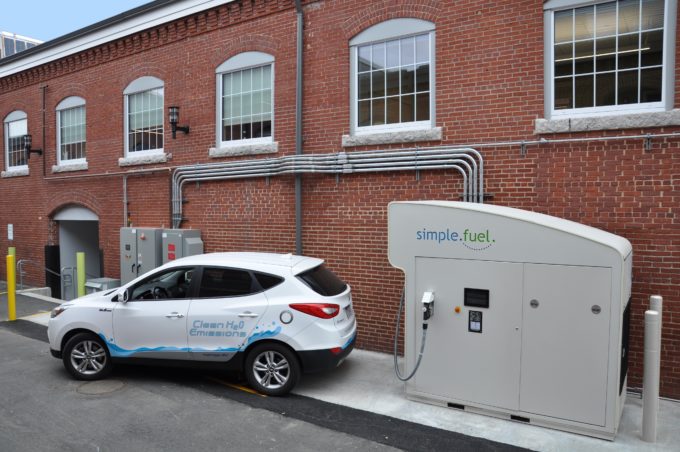At Greentown Labs, we understand that collaboration is critical to climate action. Global decarbonization will require entrepreneurs, corporates, investors, and policymakers to work together on developing and scaling solutions across the key greenhouse gas-emitting sectors: agtech + water, buildings, electricity, manufacturing, and transportation.
That’s why we convene our startups, partners, and the investor community four times a year for our Sector Pitch Day series, each time diving into the innovation areas and opportunities present in a particular sector. This summer, we zeroed in on transportation—the sector responsible for the largest share of U.S. greenhouse gas emissions in 2019, according to the EPA.
Throughout Greentown’s work with stakeholders across the climatetech ecosystem, we’ve identified three major focus areas within transportation for collaborative innovation and implementation. We’re proud to support climatetech startups that are developing solutions in each:
- Improving efficiency: upgrading efficiency of existing vehicles and fleets
Skytree employs a unique CO₂ filter, which scrubs CO₂ and water directly from the air to be used in the production of goods containing CO₂. Blackburn Energy turns any truck into a mobile platform for the creation, storage, and delivery of renewable energy by converting the kinetic energy lost during breaking and gliding into clean, low-cost electricity. VECARIUS’ patented thermoelectric generator technology converts a portion of this heat into useful electricity to reduce energy consumption, emissions, and associated costs. Alloy Enterprises is developing a new manufacturing method to change the way the world makes aluminum parts.
- Electrifying: enabling technologies for electrification
Electric Fish deploys NanoGrids at gas stations for extremely fast EV charging and grid-scale energy backup. Flux Marine designs, builds, and markets electric boat motors. Veloce Energy combines energy storage, intelligence, a streamlined installation system, and a unique charging-infrastructure-as-a-service model. SparkCharge has developed one of the first mobile electric vehicle chargers on the market that can charge at level 3 speeds, with an integrated on-demand charging-as-a-service model. OpConnect is reducing the greenhouse gas emissions caused by transportation by providing EV charging solutions that consist of charging station hardware, software, and operating services for the chargers.
- Fueling: leveraging hydrogen as an alternative fuel
Planetary Hydrogen produces green hydrogen that can be used as a chemical feedstock or energy carrier for hard-to-electrify transport. ClearValue deploys zero-net-carbon, sustainable, renewable transportation power systems via combustion of in situ, sunlight-powered, bio-chemically formed, pure hydrogen and oxygen. Advent Technologies makes high-temperature polymer electrolyte membrane fuel cells that convert hydrogen and other renewable fuels to electricity. Ivys Energy Solutions produces an on-site hydrogen generation and dispensing appliance, SimpelFuel, that uses water and electricity to produce high-purity, fuel-cell-grade hydrogen. Verne develops hydrogen storage systems for zero-emission heavy-duty trucks. Lydian Labs aims to accelerate the decarbonization of the chemical industry by electrifying the chemical production process through its printed catalyst technology. Celadyne Technologies develops a nanocomposite that can be formed like traditional polymeric membranes, but offers many benefits of a ceramic separator, such as lower hydrogen crossover.
The Transportation Sector Pitch Day explored these topics through sessions where opening speakers and our climatetech entrepreneurs shared their work and insights. We were also proud to present a speaking program featuring both Oli Qirko—Cambridge Consultants’ SVP, Head of US Industrial, Consumer, and Energy Division—and a conversation on public-private partnerships between Lara Cottingham, the City of Houston’s Chief Sustainability Officer, and Jane Stricker, bp’s Sr. Relationship Manager, Regions, Cities, and Solutions, which was moderated by Greentown’s CEO Emily Reichert.
In her remarks, Qirko emphasized that “electrification is about more than EVs,” and so the transportation sector must drive “holistic efficiency innovation” to encompass all components of mobility. Stricker and Cottingham discussed bp and the City of Houston’s partnership to support the implementation of the city’s Climate Action Plan, of which transportation is a significant focus area. The plan includes converting Houston’s non-emergency, light-duty municipal fleet to 100 percent electric vehicles by 2030; reducing vehicle miles traveled per capita by 20 percent by 2050; and more.
“We see the energy industry as having a key role in helping to achieve net-zero and take climate action,” Stricker said. “We’ve gotten to a place where we need to recognize that all companies need to be part of the solution. When Houston announced its Climate Action Plan, it felt like the perfect opportunity for us to figure out how we can bring our capabilities, expertise, and resources to help a city like Houston progress its Climate Action Plan. I see transportation as a microcosm of the whole energy transition—it is going to take an ‘all of the above’ set of solutions to get there.”
Upcoming Sector Pitch Days will focus on electricity, buildings, and manufacturing. Interested in attending? Reach out to us at hello@greentownlabs.com.


